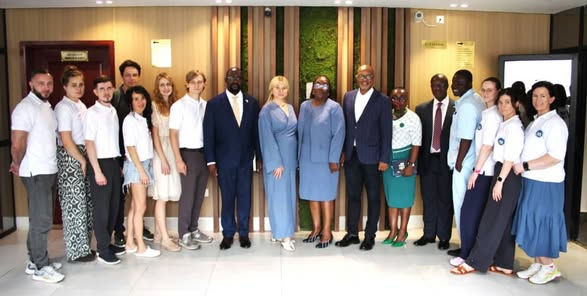Ministry of Technical and Higher Education and NSDC Host Workshop on Digitalization Scoping Assessment.
- Richard Williams, SLENA Correspondent.

- Nov 25, 2024
- 3 min read
The Ministry of Technical and Higher Education (MTHE), in collaboration with the National Skills Development Corporation (NSDC), organized a workshop on digitalization scoping assessment at the Multi-Purpose Hall of Fourah Bay College (FBC) on November 21, 2024. The workshop focused on enhancing skills development and human capital among Sierra Leonean youth.
Director of Research, Planning, and Development’s Overview
The MTHE Director of Research, Planning, and Development, Delivering an overview, Ms. Sia Fasuluku, highlighted the Ministry's partnership with NSDC in India, formalized earlier this year through a Memorandum of Understanding (MoU). She emphasized the MoU's goal of developing a comprehensive skills platform tailored to Sierra Leone’s needs. Fasuluku noted that Sierra Leone’s youthful population presents immense potential for TVET (Technical and Vocational Education and Training) initiatives, which remain a top government priority to address middle-level workforce demands.
She explained the platform’s role in collecting and analyzing student data to facilitate targeted skills development, achieved through collaborations between higher education and TVET institutions. This digital initiative will establish a fact-based foundation for a robust skills development system.
Minister of Technical and Higher Education’s Keynote
Minister of Technical and Higher Education, Dr. Ramatulai Wurie, detailed the journey of the NSDC collaboration, which began in February 2024 during a World Bank-organized meeting in India. She underscored the importance of leveraging digital platforms for skills training, drawing from India’s 16-year experience with similar systems.
Dr. Wurie outlined Phase 1 of the initiative, focusing on developing a localized platform owned by Sierra Leoneans, aligning with President Julius Maada Bio’s “Big Five” agenda. The platform aims to integrate technical skills with financial literacy and job creation opportunities, transforming young Sierra Leoneans' employment prospects.
She also emphasized the importance of aligning skills training with labor market demands and involving public and private sector stakeholders to enhance workforce readiness. Highlighting challenges, Dr. Wurie stressed the need for implementation frameworks, policy integration, and active participation from all sectors.
Council of Heads of TVET Institutions’ Perspective
Osman Turay, National Secretary General of the Council of Heads of TVET Institutions, emphasized the transformative role of digitalization in education. He acknowledged the potential of digital tools and platforms to deliver quality education and close the gap between institutions and industries.
Turay outlined plans for a nationwide data collection exercise on TVET institutions to inform policy, resource allocation, and strategic planning. He also announced an upcoming seminar addressing critical issues in TVET operations, with stakeholders from diverse sectors expected to participate.
Youth Empowerment Focus
Jemilatu Jalloh, Youth Empowerment Officer at the National Youth Commission, spoke on the importance of digital transformation in empowering young people. She highlighted plans to expand digital learning centers nationwide, targeting entrepreneurship and social skills. She described the scoping assessment as a crucial first step toward implementing effective digital transformation initiatives that align with organizational growth and community needs.
Sierra Leone Student Loan Scheme’s Input
Paul Amara, CEO of the Sierra Leone Student Loan Scheme, discussed the role of digital platforms in enhancing transparency and preventing fraud within the loan system. He emphasized ongoing collaboration with stakeholders to integrate digital solutions that streamline loan processes and ensure accountability.
The workshop concluded with a call for a collective effort from all stakeholders to implement the digitalization initiative effectively, foster innovation, improve educational outcomes, and address the evolving needs of Sierra Leone’s workforce.
By: Richard Williams
SLENA Correspondent




Comments